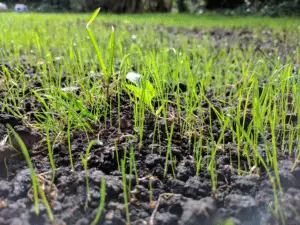Table of Contents
 Do you have a question about how long grass seed will germinate? We’ve got you covered.
Do you have a question about how long grass seed will germinate? We’ve got you covered.
Many people are confused about this topic and don’t know what to do if their grass seed doesn’t germinate after purchasing it. In this article, we will provide you with the answer to your question. We will also explain why it might take a longer time for grass seed to germinate and what you can do to speed up the process. So read on to learn everything you need to know about how long grass seed germination takes!
How Long For Grass Seed to Germinate? – Process
The germination process begins as soon as the seeds have been shed. The time it takes for grass seeds to germinate depends on the temperature and moisture in the soil where they are planted. If the temperature is warmer, the faster they will grow. The cooler it is, the slower they will grow.
Another frequent question by gardeners is:
How long for grass seed to sprout?
The answer to this question is, that it depends upon different factors which affect the growth of a plant from its germination.
If you live in a temperate climate and haven’t planted your grass seed yet, then let’s say late February through early March would be a good time to plant them. This is because most plants require at least six weeks to grow from seedling to mature plant form. Suppose you live in an area with a short growing season (like Florida); plant your grass seeds in December so they can grow into full-sized plants by spring when there is enough sunlight to photosynthesize and produce lots of energy for growth. Grass seed germinates best in cool weather, so plan your planting time accordingly. You can plant seeds anytime, but spring is the most common time for seeding grass.
How Long Does It Take for New Grass to Grow?

Germination is the beginning of plant growth. It occurs when a seed breaks through its hard outer coat to reveal its inner germ. The seed has an embryo that must be nurtured and kept warm until it is ready to sprout into a new plant. To germinate, the seed must first expose to the soil. Once exposed, it will begin to absorb moisture and nutrients from the earth in preparation for its next step: sprouting.
After sprouting, the question arises, how long does it take for new grass to grow?
The answer is, that it can happen in as little as 24 hours, or it can take up to a few months for seeds to sprout and grow.
So when do you know if your grass seed has germinated? It has germinated when the radicle (root) begins to push through the soil, usually within 6-8 weeks. The first sign of germination is rooted in the soil surface. This is followed by sprouting leaves and then flowering depending on the species and variety of grass seed you are planting.
Factors Effect on Germination
Many factors affect grass seed germination. These factors include temperature, soil conditions and exposure to light. Some seeds are more tolerant of cold than others, while some plants require more water than others.
Classification of Germination Seeds
Grass seeds are generally classified into cool-season grasses and warm-season grasses. Cool-season grasses germinate within a few days, while warm-season grasses require at least 2 weeks for germination.
How Long For Grass Seed to Germinate
Grass seed germination will take a few weeks to several months, depending on the type of grass you’re planting and its variety. Here are some guidelines:
Perennial grasses — such as timothy or bahiagrass — will germinate in about two weeks.
Other perennial grasses such as St. Augustine and zoysia<span style=”font-weight: 400;”> start growing after about three weeks. If you want to ensure your perennial grasses will survive winter, plant them in autumn.
Annual ryegrass seeds are planted anytime during the growing season (spring through fall). When you plant them in spring or summer, they’ll quickly grow into a nice lawn that can withstand summer heat and cold winter fronts. If you want a slower-growing lawn on your property, consider planting ryegrass in late summer or autumn when temperatures are cooler and less harsh on their growth.
Best Time to Seed
Before seeding the grass, check the temperature; it should be between 65 and 75 degrees. The soil temperature should be warm but not hot. As the temperature rises above 85 degrees, it may kill the seed.
The amount of light has a direct influence on germination. If you want your seed to germinate quickly, provide bright light; if it takes longer, uses indirect sunlight or shade.
Some grasses need more than others. For example, Kentucky bluegrass requires at least six weeks before it will sprout. On the other hand, Bermuda grass only needs four weeks before sprout.
Factors Affect Germination

Factors affecting the germination of grass seed include:
- The temperature during germination.
- The type of soil or compost
- Sunlight and humidity
- The length of time from sowing to harvest
Temperature
The best temperature for grass seed to germinate is around 75 degrees Fahrenheit. When temperatures are too low, the seed will not sprout, and the grass seed may rot if they are too high. Most seeds will not germinate at temperatures below 60 degrees Fahrenheit.
Soil or Compost
Grass seeds can plant directly in the ground or a pot of soil. The most common method is to plant the seed in the soil, which will sprout and grow roots over the first few weeks. This is sufficient to establish a lawn but may not provide enough nutrients for it to thrive.
The second option is to use Compost as a growing medium. A layer of garden soil at least 6 inches (15 centimetres) deep should be used, with no weeds present. A 2-inch-deep layer of Compost makes an excellent mixture for starting grass plants from seed.
Watering frequency
Allow soil to dry out between waterings is important because this helps ensure that no pathogens are present in the soil, damaging your grass seedlings if they don’t germinate properly.
Mulch thickness
Thinner mulches can allow more light which speeds up the process of germination. Coarser
materials like wood chips or bark will slow the rate at which grass seeds sprout.
Grass variety
Some varieties take longer than others. For example, Kentucky bluegrass will germinate in about seven to 14 days. Zoysia grass will take between four and six weeks to germinate.
Sunlight
To grow grass from seed, you need light and darkness. Light encourages grasses to grow while darkness helps them stay dormant during winter.
Conclusion
If you’re wondering how long grass seed needs to germinate, we’ve got you covered! In this article, we’ve explained all you need to know about grass seed germination. We’ve included factors that affect the rate of germination, as well as classified the types of grass seeds according to their germination time. So, by reading this blog, you’re one step closer to having a healthy lawn!
